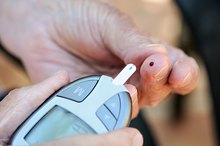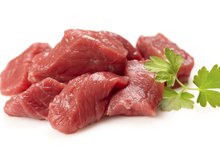Signs & Symptoms of Low Hemoglobin Count
Hemoglobin, an iron-rich protein in red blood cells, transports oxygen from the lungs to cells throughout the body. All body cells need oxygen to function. According to Mayo Clinic, hemoglobin should be more than 13.5g per deciliter for men and 12g for women. Though your doctor will verify your count with a simple blood test, there are several signs and symptoms of a low hemoglobin count.
Fatigue and Weakness
Patients most often complain of fatigue and weakness with a low hemoglobin count, according to the National Heart Lung and Blood Institute. Because the cells do not receive enough oxygen, muscles do not work efficiently, causing them to ache when overused. Often, a person with low hemoglobin will complain of aching legs and the inability to walk any significant distance without pain.
Headache, Dizziness and Fainting
Signs & Symptoms of Low Hemoglobin Count
Learn More
Because of the lack of oxygen going to the brain, people with low hemoglobin often complain of headaches. Dizziness may occur when rising from a chair quickly and they may faint if standing for long periods.
Lack of Concentration
Lack of concentration and forgetfulness occur in people when there is not enough iron in their blood. This is a serious issue in children, who may feel weak, tired and cranky. Children with low hemoglobin may do poorly in school and develop behavioral problems.
Heart Palpitations and Chest Pain
How to Test at Home for Iron in the Blood
Learn More
Abnormal heart rhythms may result from low hemoglobin levels. The heart must pump harder to compensate for the lack of oxygen in the circulating blood. This lack of oxygen may also cause a shortness of breath.
Pale Skin and Gums
A pale complexion may signify lack of oxygen in the blood cells. A low hemoglobin count may be even more noticeable in the nail beds and gums, both of which should be a healthy pink.
Pica
Pica is the craving to eat inedible or unusual substances. People with iron deficiency and low hemoglobin may eat dirt or starch. The National Anemia Action Council states that the desire to chew on ice often signifies anemia and advises patients to have their hemoglobin checked. Chewing ice may be one of the less dangerous cravings.
Inflamed or Sore Tongue
An inflamed tongue and cracks in the edges of the mouth may occur with an iron deficiency. These are not serious symptoms but may be very uncomfortable. Because of the soreness, the patient may not eat properly, making the deficiency worse.









